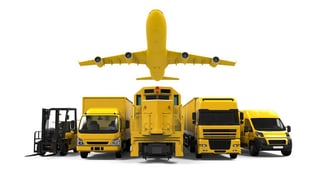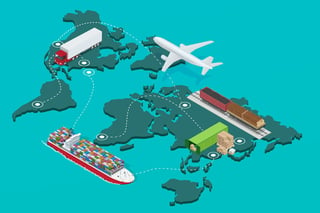Freight forwarder vs. customs broker vs. full-service logistics provider
Freight forwarder vs. customs broker vs. full-service logistics provider
4:54
Are freight forwarders the same as customs brokers? What’s the difference? And what is a full-service logistics provider anyway?
Freight forwarder
Freight forwarders primarily organize the delivery path of goods. They arrange for cargo to move from an origin to a destination by air, ground, or sea within a specific time frame. They monitor all the details of that movement including paperwork and documentation, so that shipments flow across international borders with compliance and efficiency, and without delays.
Customs broker
Customs brokers are responsible for preparing and clearing a customs entry once a shipment arrives at a border/port of entry. They are licensed, regulated, and empowered by a country’s border agency. They submit the necessary information and payments to the agency on behalf of their clients. They must be experts in the entry procedures, admissibility requirements, classification, valuation, the rates of duty, and applicable taxes and fees for imported merchandise.
What’s the difference?
Freight forwarder is a more broad term; customs broker is very specific. While a freight forwarder can manage shipments that begin in one country and end in another, a customs broker deals only with the part of the journey where the shipment has reached the border. A customs broker is dealing with the import side of the equation: goods entering a country (as opposed to leaving the country where they originated).
Full-service logistics provider
A company that offers both freight forwarding and customs brokerage provides door to door service, making the entire export/import process seamless. Full-service logistics providers secure and coordinate the transportation, gather the necessary paperwork, clear the goods, and arrange for final delivery.
An international logistics partner can advise on the most efficient and cost-effective mode of transport (air, sea, land) and routing based on a client’s time frame. They can also assist an importer or exporter in understanding and selecting the optimal Incoterm, based on the desired amount of risk and responsibility.
Real-life examples
Case study 1
An exporter in Kentucky wants to send several vehicles to Vancouver. Their freight forwarder gives them a quote for the shipment and asks if the dealership in Canada has a customs broker. They say they do, so the freight forwarder handles only the shipping.
The exporter (car manufacturer), working with the importer (car dealership), will need to contractually agree on terms of sale (the Incoterms) and the transaction details, including the hiring of a customs broker, among other things. In this example, the freight forwarder and customs broker are two separate entities; the exporter must manage both his partnership with the forwarder as well as the transaction with the importer.
Case Study 2
In this version of the story, the car manufacturer (exporter) instead says that the dealership in Canada doesn’t have a customs broker. The freight forwarder asks if the exporter would like the freight forwarder's help clearing customs in Canada. The exporter says yes, which changes the transaction for the forwarder; now, instead of just handling the shipping to Canada, the forwarder is managing the shipping plus arranging for customs clearance. This includes the payment of duties, taxes and anything else associated with bringing goods into Canada from the U.S.
By working with a Canadian customs broker, the freight forwarder is offering their customer a full-service experience (because the customer doesn’t have to arrange for the customs broker). In this example, the equipment will be delivered without the exporter having to do any extra additional work on the import side.
Full-service logistics and beyond
At Cole, we are proud to be a full-service logistics provider integrating freight forwarding and customs brokerage, along with in-depth consulting services to ensure your goods get to their destination seamlessly and efficiently.
Our freight and customs teams work very closely with one another, following your shipment throughout its journey and using an integrated approach to ensure greater advanced visibility before your goods arrive and greater speed and efficiency once they reach the border. We get started on pre-keying of data and permit applications well before your shipment reaches our brokers so there's no waiting at the border.
We move your shipment across the border and to its destination as quickly as possible, caring for your goods every step of the way. A cohesive, collaborative logistics team has advantages that two separate stand-alone companies simply doesn't. Contact any of our three departments and let us know how we can help.

